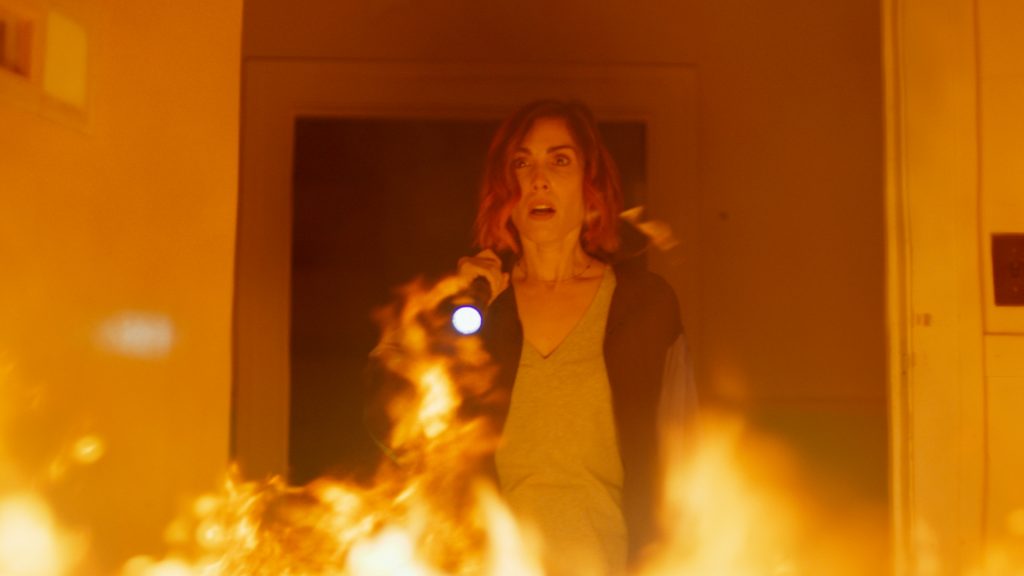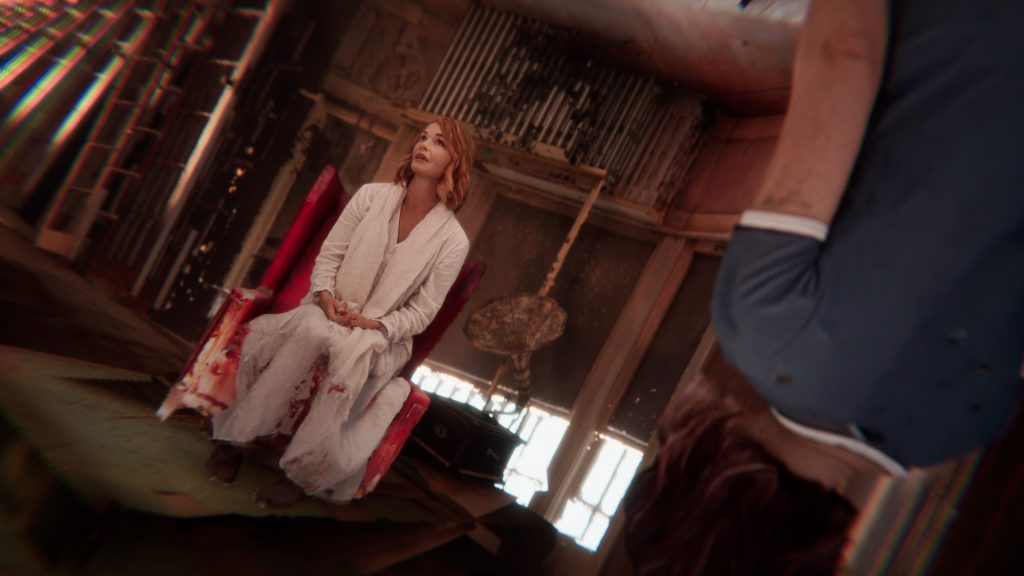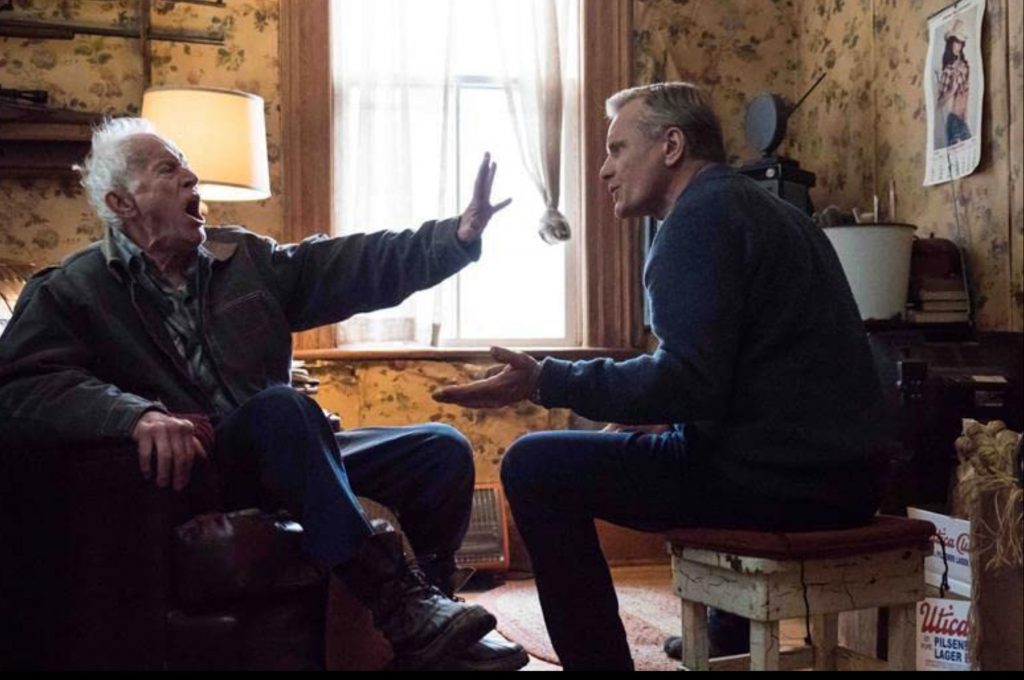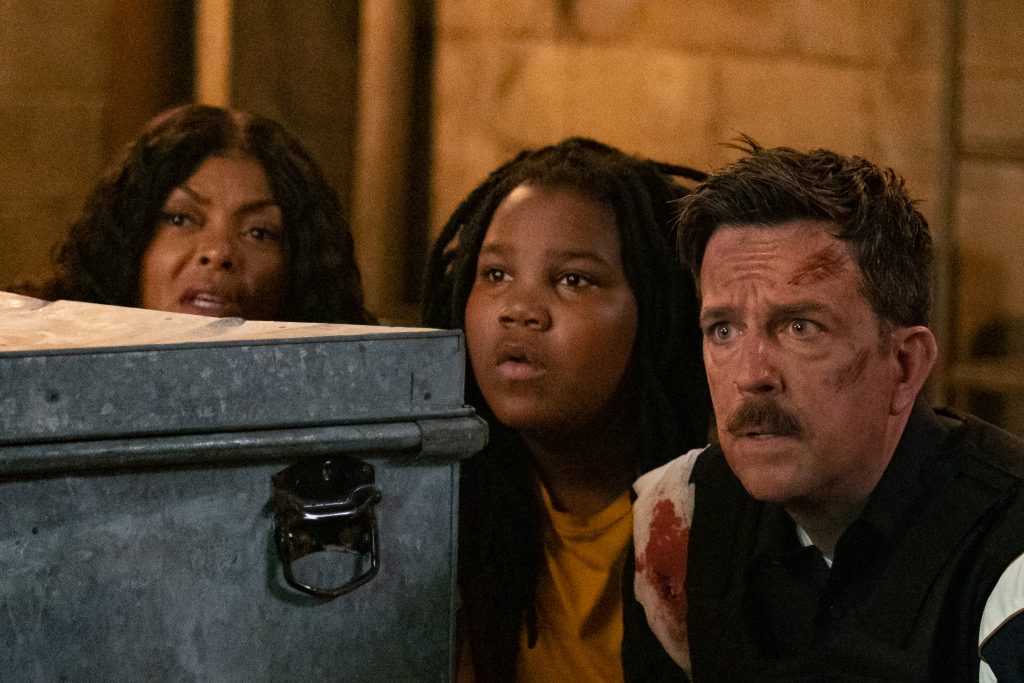September 10, 2021
by Carla Hay

Directed by Neill Blomkamp
Culture Representation: Taking place in an unnamed Canadian city, the supernatural horror film “Demonic” features a predominantly white cast of characters (with one Asian and one black person) representing the middle-class.
Culture Clash: A woman undergoes scientific experiments that could uncover secrets of her estranged mother, a convicted serial killer who might be possessed by a demon.
Culture Audience: “Demonic” will appeal primarily to people who don’t mind watching horror films that are poorly constructed with a flimsy plot.

“Demonic” is one of these terrible horror movies where hallucinations and nightmares are over-used to try and distract viewers from the badly conceived story. Expect to see a lot of boring, repetitive scenes that just lead to a ridiculous ending. The movie’s plot had the potential to be a lot better, but “Demonic” writer/director Neill Blomkamp didn’t take enough time to craft a well-honed screenplay. Some of the movie’s visuals are compelling, but they can’t make up for the weak storyline.
In “Demonic,” which takes place in an unnamed Canadian city (the movie was actually filmed in British Columbia), Carly Spencer (played by Carly Pope) is a bitter loner in her 30s. Carly spends the entire story obsessing over how much she hates her mother, a convicted serial killer who has been living in a psychiatric institution instead of a prison. Carly is written as such an incomplete character that viewers never find out anything about what she does for a living or anything else about her family. The movie makes it look like Carly has nothing going on in her life except to participate in mind-travel experiments and have nightmares/hallucinations about her mother.
Carly hates her mother Angela (played by Nathalie Boltt) because of the heinous crimes that Angela has committed. In 1998, Angela went on a murder spree where she set fire to a senior citizen care facility where Angela used to work. The fire killed 21 people. It was also discovered that over a period of time, before she committed this deadly arson, Angela had poisoned five people at her church, including Angela’s mother. Carly’s father is never seen or mentioned in the movie. It’s implied that Carly, who is an only child, was raised in a single-parent household.
Carly has one person in her life whom she turns to for emotional support: her best friend Sam (played by Kandyse McClure), an architect who is staying at a client’s remote house near a lake. It’s yet another horror movie that uses the “isolated lake house” cliché. Sam and Carly have almost opposite personalities. Sam is a bubbly and talkative extrovert. Carly is a moody and repressed introvert.
The movie’s opening scene shows that Carly keeps having nightmares of hearing her mother calling out to her in different houses, such as her childhood home. In her nightmares, when Carly finds her mother in a room, her mother is alone and usually has blood on herself. And then sometimes, the room gets set on fire.
Carly’s mother Angela barely looks older than Carly in these nightmares. It’s later explained that it’s because Angela appears to Carly in these nightmares looking like Angela did back in the late 1990s, when she committed her horrific crimes. In real life, actress Boltt is only a few years older than her “Demonic” co-star Pope, but the movie put aging makeup on Boltt for Angela’s present-day scenes.
Someone who knows Carly and Angela is a guy in his 40s named Martin (played by Chris William Martin), who has been trying to keep in touch with Carly, but she’s mostly refused to be in contact with him. It’s never really explained how Martin knows Carly and Angela and what he does for a living, even though he ends up being a crucial part of this story. You know a movie is poorly written when it doesn’t bother to mention basic elements of an important character’s life. The reason why Carly avoids being in contact with Martin is because she thinks he’s kind of crazy.
In a conversation between Carly and Sam, Carly apprehensively says that she recently got a text from Martin, even though she hasn’t been in contact with him for six or seven years. Sam tells Carly not to bother responding to Martin: “No one needs to hear his insane theories after what happened to your mother.” What are these “insane theories”? Carly is about to find out for herself if these theories might be true.
Carly ends up replying to Martin’s message. She agrees to meet with him in person to hear what he has to say. Martin tells her that Angela is currently in a coma and is a patient in a medical research facility. The facility is called Therapol. Soon after her conversation with Martin, Carly gets a phone call from a Therapol scientist named Michael (played by Michael J. Rogers), who asks Carly to come to the facility because Angela “isn’t doing so well.”
Carly is reluctant at first, but curiosity gets the better of her. When she goes to Therapol, she meets Michael and his assistant researcher Daniel (played by Terry Chen), who both are conducting top-secret mind experiments. Michael explains to Carly: “A lot of our technology is so new, it doesn’t exist outside of this building yet.” And they want Carly to participate in the main experiment that they’re conducting.
In this experiment, someone puts on a headset with electrodes linking to the brain. The participant can then enter the mind of someone else who’s wearing a matching headset. The participant entering the other person’s mind has an experience of being in a simulation or in a virtual reality world. The visuals for these “mind travel” scenes look like a pixelated video game, but they’re still striking to look at, even if these scenes end up being a lot of filler in “Demonic.”
Before Carly enters her mother Angela’s mind, Michael and Daniel show Carly what her mother looks like in a coma, which the scientists called “locked-in syndrome” or LIS. Angela is in terrible shape, with her veins bulging on her face and matted hair. It looks like she’s on her deathbed. Michael and Daniel want Carly to enter Angela’s mind to find out why Angela committed the murders. After some reluctance, Carly agrees to this experiment.
Daniel explains the technology in this mind simulation headset: “We redirect these [brain] impulses to a digital version of your mind. And in that virtual space, you will meet your mother. But you have to think of it as stepping into someone’s mind—her mind. It can be very confusing to the outsider, because a piece of one space can be inserted into another, kind of like a dream … We can hear and see you, but you cannot hear us. If you ask, we will pull you right out immediately.”
When Carly enters Angela’s mind for the first time, there’s a scene where, once again, Carly enters a house and sees Angela sitting on a bed. But in this mind simulation’s initial encounter, Angela’s back is turned to Carly and she won’t look at her daughter when Carly unleashes the pent-up animosity that she’s had for her mother for all these years: “I never got a chance to tell you how much I hate you! I’m here to tell you how fucking disgusting you are!”
Angela remains calm and accepting. She replies, “Carly, I know that. Now, I need you to leave. You have to go.” At first, Carly thinks she did what she needed to do and has gotten her anger out of her system. But she agrees to do more mind simulations, at the urging of Michael and Daniel. The movie than drags on with more mind simulations where Carly continues to confront her mother. It becomes very tedious after a while.
It’s not spoiler information to say that Martin believes that Angela has been possessed by a demon that caused her to commit the murders. The question then becomes, “Will Carly be cursed by this demon too?” The trailer for “Demonic” reveals way too much information about the movie, including what the demon looks like. The demon (played by Quinton Boisclair) can best be described as resembling the movie monster known as The Predator, but with a wild bird’s head.
There’s absolutely nothing surprising that happens in “Demonic,” which is just a series of half-baked scenes strung together with unremarkable acting from the cast members. The movie’s ending is embarrassingly bad, like a ripoff of other derivative horror flicks. It’s all such a letdown, considering that Blomkamp is the same writer/director behind the highly acclaimed 2009 sci-fi film “District 9,” which was his feature-film directorial debut. His subsequent feature films have been on a steep decline of quality. “Demonic” is nothing more than a disappointing and forgettable horror flick that doesn’t bring any interesting or original ideas to the genre.
IFC Films/IFC Midnight released “Demonic” in select U.S. cinemas, on digital and VOD on August 20, 2021.




